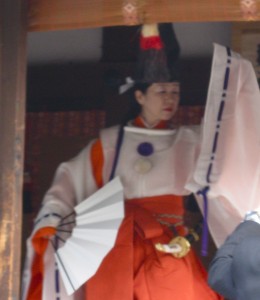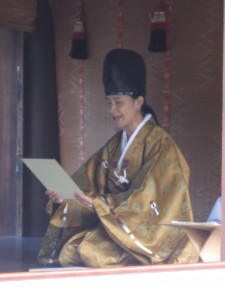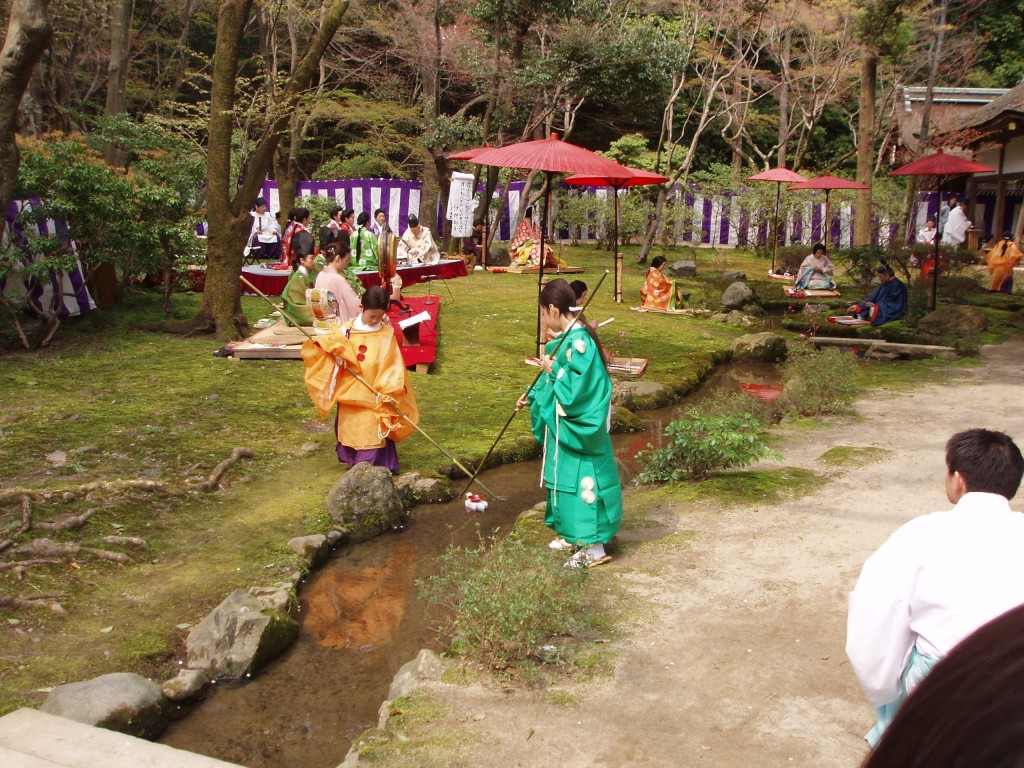On Saturday I went to see a renku (linked verse) session, held at a subshrine of Kitano Tenmangu as an offering to the kami. This being Japan, and Shinto being Shinto, ritual was of the essence throughout. There was even a lengthy ritual of preparing the honorary ink-stone and brush – though they were not actually used since the verse was written in pencil !

A dance for the gods
Renku are usually 36 verses in length: in this case thirty had been written beforehand, leaving six to be composed on the spot. At their completion there was a dance performance with singing of the verses. Divine! The next day a follow-up was to be held at a Buddhist temple, showing that the syncretic spirit lives on in linked verse as elsewhere.

Chanting the written verses
A poetic week
One way and another I’ve had a most poetic week, rounded off with reading Chinese Tang poets and the Tao Te Ching today with my friend, the Taoist-Tibetan sage A.J.
Worldgirdling
Spacegracing
Passionenergy
Insightplay
Fallingwordfun
On my return from our café klatsch in the autumn rain, I was reminded of the following rather wonderful description of the spiritual aspects of haiku. It makes clear why verse is such a suitable offering to the kami.
**********************************************************************
“Let me explain what I think haiku can do for the spirit. I believe that all the great sacred traditions show that consciousness began with only inner light, in a time when humanity was in union with a Supreme Being and Creator… The haiku woman or man (rather than the poet) is a person who stands inside a chaotic darkness and waits. This is not an idle way of waiting; it is alert, conscious and focused. What do they wait for? They wait for the lightning to strike – that lightning which illuminates the world around them.
To look at the world boldly, in the sudden light of haiku consciousness is to commit an act of love and complete understanding. Looking becomes presence – the gift of seeing, in depth, and with the power of discernment. It is a kind of satori beyond the critical mind and devoid of criticism. Compassion permeates this kind of mindfulness and attentiveness. Haiku leads us in the right direction, homewards, in a process of rediscovery and reassimilation of our compelling and inherent universal values.
In today’s prevailing atmosphere of chaos and disorder, haiku consciousness brings into focus the ambient disruption and cacophony, while highlighting the need for serenity, for the homecoming. We have lost sight of our own nature in the whirl of the day-to-day, in the fog of petty concerns. The quotidian overwhelms the crucial values of our existence; myopic greed and consumerism have put us at odds with our environment, with our only planet. Through haiku we can inch closer to a reconstruction of the lost harmony between ourselves and nature.
There are many words for what we have lost; our Tao, our way, our union with the gods, our fullness, our wholeness, our completeness. There can be no other remedy but a return to older ways of thinking and feeling. Haiku creates a new old completeness of Earth and Heaven, Man and God, visible and invisible. Through it we can train ourselves to regain our old consciousness.
This is my agenda for haiku consciousness; to awaken our metaphysical sensitivity, open our eyes wide, and—in a flash of understanding of all our blind decisions and wrong turns—finally choose the only tenable option, a soothing spiritual path to heal and recuperate, path for which we can use the same name as ancient traditions did – Tao, the Way, Eternal Home.
We must learn or relearn how to give love and how to receive love.”
***********************************************
Extracted from Dr Drago Stambuk’s keynote address to the Asian Conference on Literature and Librarianship, 2011, in Osaka

The Heian-era verse writing festival held every spring at Kamigamo Jinja

“The haiku woman or man (rather than the poet) is a person who stands inside a chaotic darkness and waits.”
Standing in darkness waiting is a very good metaphor, I think. However, what is the basis for drawing a distinction between the process of writing haiku and that of writing poetry or any other form of literature? Perhaps “the poet” here means “someone recognized publicly as a poet” as opposed to the amateur poet. Even if so, how can or should this first step in the creative process be different for different kinds of creators?
Thanks, David… It’s a good point: what makes a haiku different from a three-line verse? Too often there’s no difference at all, but I think at its best haiku aspires to more than mere creativity, as intimated by Drago Stambuk. It’s a spiritual element, rather than simply artistic… something that takes us beyond the mundane rather than mirroring or recreating it… something, as Stambuk suggests, to do with oneness…
‘Haiku leads us homewards’. HOME is Harmony Of Mind Expressed. Haiku is certainly ‘home’ for me. Without it, I would be lost. Read or written, it is the best travel companion, too. Even if the haiku image is not a restful one, the magical open-endedness of such verse draws the reader in, engendering the empathy of one playing a part in the moment. From this, a compassionate feeling emerges. Detachment and involvement in equal measure?